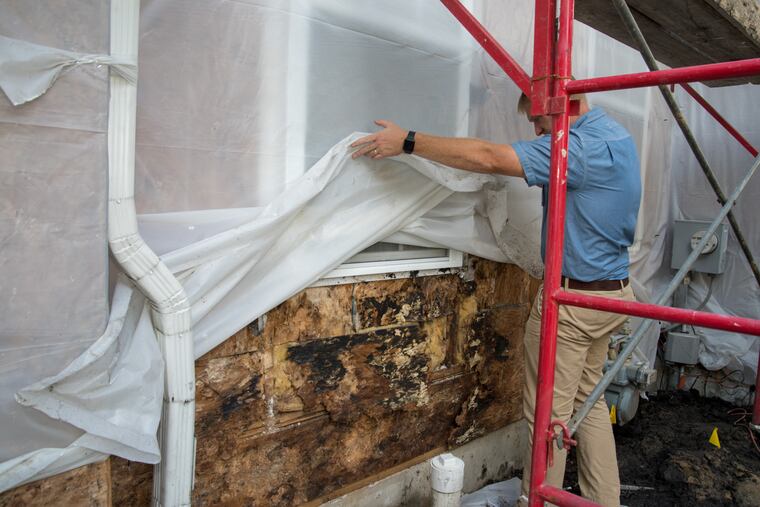L&I seeks to add inspections to new homes after water damage complaints across Philadelphia
The possible change in the city’s inspection process comes after a 2018 investigation by the Inquirer, which found that hundreds of homes in the Philadelphia region were experiencing problems with water intrusion.

The Department of Licenses and Inspections hopes to roll out a new inspection program next year for homes under construction, following complaints across the city of water penetration in shoddily built homes.
L&I Commissioner David Perri said Thursday that in coming months, his department hopes to institute special inspections for “building envelopes," the several layers of material between an exterior wall and the drywall within. It is crucial that building envelopes are properly installed to keep water out and prevent mold, decay, and water damage from invading.
The possible change in the inspection process comes after a 2018 investigation by The Inquirer, which found that hundreds of homes in the Philadelphia region were experiencing problems with water intrusion — caused by rushed production, undertrained workers, lower-quality materials, and lax oversight by builders and code inspectors. The investigation found that more than 650 homeowners in at least 55 zip codes were living in houses so damaged by water that each required tens of thousands, and sometimes hundreds of thousands, of dollars in repairs.
In many cases, water and condensation crept through small cracks, but the damage was often impossible to see. Underneath seemingly unblemished exteriors — brick, stucco, and vinyl siding, for example — water had saturated wooden boards and sheathing, causing it to crumble into mulch-like chips. Some houses were so waterlogged that they had become structurally unstable, lawsuits claimed.
Pennsylvania is often considered the epicenter of an industrywide water intrusion epidemic, but homeowners have little recourse. Some choose to litigate; others pay for repairs. Many are stuck in homes that they will likely have trouble selling.
While Pennsylvania law requires municipal code inspectors to monitor a building’s foundation, framing, and plumbing, for example, during new construction they are not required to specifically check building envelopes. Governments can add more inspections if they choose.
“I would like to get special inspections for the exterior envelope completed ... to keep new construction weather-tight,” Perri said. “That’s basically a response to an article [The Inquirer] wrote ... about the enormous costs to residents when they discover their homes have significant leakage.”
“We want to have a higher degree of expertise look at the sequence of construction,” Perri continued.
Earlier this year, Republican and Democratic lawmakers in Harrisburg introduced a bill aimed at better regulating new-home construction in response to The Inquirer’s findings. Among other provisions, the legislation would establish a fund from which consumers could collect if their builder does not or cannot pay out a settlement awarded by a court.
The legislation also would require any home builder or limited liability corporation to notify consumers soon after the company becomes aware of a construction defect. The bill sits in committee.
Perri’s desire for building envelope inspections comes as L&I looks to beef up construction oversight. In recent years, the city has seen numerous construction collapses and damage to residents’ homes as developers and contractors contribute to the city’s building boom.